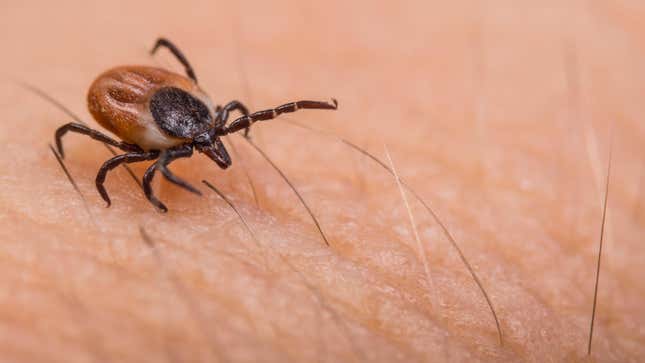
A large-scale trial for a crucially needed vaccine has just gotten underway. Over the weekend, the first volunteers enrolled in the trial testing out a Lyme disease vaccine candidate developed by Pfizer and Valneva. Researchers hope that the multi-dose shot will protect kids and adults against six strains of the bacteria that cause Lyme in both the U.S. and Europe.
The candidate is code-named VLA15. Typically, vaccines train the immune system to recognize a germ, or some important part of it, so that we can better fight off the real thing if it ever enters our body. The strategy used with VLA15 is a bit tweaked, though, thanks to a quirk in how we catch Lyme from ticks. Lyme bacteria (Borrelia) live inside the gut of ticks and are usually only transmitted to humans a day or more after a female tick has started feeding on us. The vaccine is supposed to teach our body to spot a protein on the surface of Lyme-causing bacteria known as OspA. The hope is that ticks will slurp up anti-OspA antibodies from our blood, allowing them to reach the tick’s gut and stop transmission before it can even take place.
The new study is a phase III randomized, double-blinded, placebo-controlled trial that’s expected to enroll around 6,000 volunteers over age 5 who live in areas of the U.S. and Europe where Lyme is endemic (according to the trial’s pre-registered design, up to 18,000 participants may ultimately be recruited). Test subjects will be given three doses of VLA15 or a placebo before the next tick season in the spring starts, then a booster shot a year later. It’s possible, though not yet established, that people would require boosters to maintain strong immunity against Lyme over time.
“With increasing global rates of Lyme disease, providing a new option for people to help protect themselves from the disease is more important than ever,” said Annaliesa Anderson, senior vice president and head of vaccine research and development at Pfizer, in a statement. “We hope that the data generated from the Phase 3 study will further support the positive evidence for VLA15 to date, and we are looking forward to collaborating with the research sites across the U.S. and Europe on this important trial.”
Even if VLA15 does work as intended and is eventually approved, it wouldn’t be the first vaccine of its kind to reach the public. There is an existing vaccine for dogs, and in 1998, the OspA-based vaccine LYMERix was approved for people in the U.S. by the Food and Drug Administration. But low consumer demand led to its makers pulling the vaccine off the shelves by 2002. The unpopularity of LYMERix may have reflected the lack of appreciation of Lyme as a serious health concern back then, and it wasn’t tested nor approved for children under 15. But its lack of public buy-in was also aided by fears that the vaccine could trigger serious, lingering complications in some people, particularly the sort of chronic arthritis symptoms seen sometimes with Lyme disease—fears fueled by that era’s anti-vaccination movement.
Studies at the time and since have found no good evidence that these speculated risks actually existed. And the new generation of OspA vaccines, VLA15 included, have been further modified to avoid provoking the sort of immune response that could even theoretically cause such complications. In earlier studies, VLA15 appeared to produce a strong response to OspA in volunteers with no serious safety risks flagged. Unlike LYMERix, VLA15 has also been designed to produce immunity to multiple strains of Lyme common across the U.S. and Europe.
Pfizer and Valneva’s vaccine candidate isn’t the only potential anti-Lyme weapon in development right now. Elsewhere, researchers are working on lab-created antibodies to Lyme, with the intended strategy being that people would take the antibodies once a year before the start of tick season. And scientists at Yale are working on a tick bite vaccine, one that would train the immune system to become rapidly allergic to a bite, preventing the tick from finishing its meal and spreading Lyme as well as other tickborne infections.
These tools are sorely needed. Nearly a half-million Americans are estimated to contract Lyme annually, and the ticks that spread Lyme in the U.S. and Europe are broadening their range and staying active longer into the year, further endangering more people.